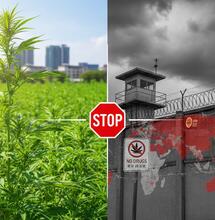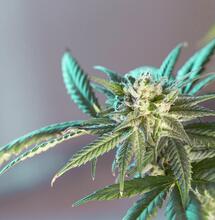CDC: Teens Now Favor Pot Over Cigarettes

A study released Friday (PDF) by the Centers for Disease Control (CDC) found that in 2011, for the first time ever, more American teens were smoking marijuana than cigarettes.
SOURCE: www.rawstory.com AUTHOR: Stephen C. Webster
The CDC's annual Youth Risk Behavior Survey tracks drug abuse, among other potential destructive behaviors, by surveying high school students across the country. The agency said it collected data from more than 15,000 surveys taken in 43 states and 21 large urban school districts. The result: Marijuana is officially more popular than cigarettes among U.S. teens, for the first time ever.
A full 23 percent of students surveyed told the CDC they had used marijuana within the last month, whereas just 18 percent said they had smoked cigarettes. The findings are consistent with a Raw Story analysis of the 2011 Partnership for a Drug-Free America report on teen drug abuse, which found that marijuana's popularity has exploded since 2008.
By comparing the Partnership's data to prior CDC studies, Raw Story concluded that marijuana use had finally exceeded cigarette smoking among U.S. teens, which the CDC has now confirmed directly. The Partnership's report noted that almost half of American teens (47 percent) said they have used marijuana at least once, representing a 21 percent increase over their 2008 study.
The CDC, on the other hand, noted in 2009 that 30 percent of high school students reported having experimented with cigarette smoking at least once, down from 39 percent in 2000, while about 24 percent had used a tobacco product (including chewing tobacco) recently, down from 34.5 percent. There are several possible ways to contextualize the swing among American teens from cigarettes to marijuana, but one sticks out above all the rest: the economic recession.
Researchers at the University of New Hampshire reported in 2010 that they had debunked the "gateway drug" theory through scientific analysis of assorted risk factors that contribute to the desire to abuse more destructive drugs like heroin or prescription pills. Instead of early experiences with marijuana weighing significantly on that decision, researchers found that other stress factors like unemployment weigh much more in determining a teen's likelihood to become addicted to harder, potentially lethal drugs.
"Employment in young adulthood can protect people by ‘closing' the marijuana gateway, so over-criminalizing youth marijuana use might create more serious problems if it interferes with later employment opportunities," one of the study's authors said in a press release. The U.S. Bureau of Labor Statistics reported in April that teen unemployement was hovering around 25 percent, down from 27 percent in 2009 - its highest rate since the Great Depression, and roughly 10 percent higher than the teen unemployment rate in the years leading up to the near economic collapse of 2008.
Added: Since no such regulatory framework exists for marijuana, and since drug dealers do not tend to check IDs, most youths told the National Center on Addiction and Substance Abuse in 2009 (PDF) that pot is easier to purchase than regulated substances. The Campaign for Tobacco-Free Kids has consistently raised issue with "youth-penalty laws" (PDF) that punish kids for using tobacco, saying the laws are favored by tobacco companies because they oppose the truly effective means of control, like public education, restrictions on marketing and increased retail prices.
By agreeing to penalize the end user, the Campaign claims that lawmakers ultimately just "divert the police from their efforts to stop retailers from illegally selling tobacco products to kids," which results in breeding "disrespect for the law" among young people.
The Drug Policy Alliance, America's leading drug policy reform group, says something startlingly similar about marijuana."It's time to step back and ask ourselves what's the best way to solve the problem we're trying to solve-how to reduce drug abuse and addiction-and use the best available evidence to guide us," Jag Davies, publications manager for The Drug Policy Alliance, said in a recent advisory.
"And, ultimately, it's time to bring marijuana out of the shadows and under the rule of law. The evidence shows that the most effective way to reduce teen marijuana use would be to regulate it in a manner similar to alcohol, with age limits, licensing controls, and other regulatory restrictions."



